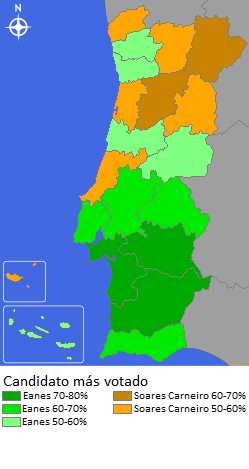7 December 1980 | ||||||||||||||||
| Turnout | 84.39% ( | |||||||||||||||
|---|---|---|---|---|---|---|---|---|---|---|---|---|---|---|---|---|
| ||||||||||||||||
| ||||||||||||||||
| ||||||||||||||||
Presidential elections were held in Portugal on 7 December 1980.
Contents
- Electoral system
- Candidates
- Official candidates
- Campaign period
- Party slogans
- Results
- National summary
- Results by district
- Maps
- Notes
- References
- External links
Incumbent president General Ramalho Eanes gathered the support of the Socialist Party, despite the objection of their leader, Mário Soares, and also the support of the Portuguese Communist Party, whose candidate, Carlos Brito, withdrew the week before the election giving his support to Eanes. The Communist Party of the Portuguese Workers also gave support to Eanes, whose picture became a feature on numerous walls around the country, painted by Communist Party activists.
One of the major players in the democratic revolution of 1974, Otelo Saraiva de Carvalho, was also a candidate, for the second time, but finished far behind his previous result of 1976. The newly founded Workers Party of Socialist Unity presented its own candidate, Aires Rodrigues.
His main opponent, General Soares Carneiro, was known for his right-wing views and was branded by opponents as a hardliner, with links to the dictatorial regime that had been overthrown only six years earlier. He was supported by the Democratic Alliance, a centre-right coalition of the Social Democratic Party, the Democratic Social Center, and the smaller People's Monarchist Party.
Two days before the election, two of Soares Carneiro's leading supporters, Prime Minister Francisco Sá Carneiro (no relation) and Defence Minister Adelino Amaro da Costa, died in the 1980 Camarate air crash while they were heading for a rally in Porto. Despite the accident, the election went ahead as planned, and predictions that a second round would be needed were shown to be wrong, with Ramalho Eanes winning with almost 57 percent, against 40 percent for Soares Carneiro.





